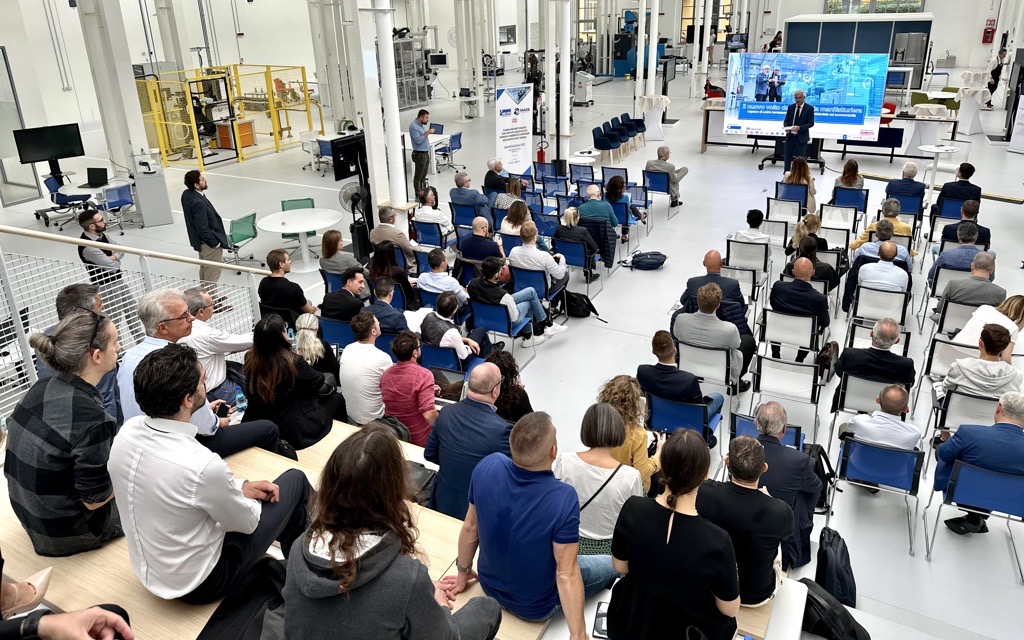10
Oct
MECSPE and MADE – Competence Center Industry 4.0: “The new face of the manufacturing industry”

SMEs are pushing digitalization and awareness of green issues is growing. Digital Innovation Hub and Competence Center key figures, together with MECSPE, to push digital transformation.
- Digitization: seven out of 10 businesses have experienced digital growth in the past year. For 67 percent, AI will be an important ally for the manufacturing industry in the coming years.
- Sustainability: the level of knowledge of ESG criteria rises to 46 percent, and more than a third consider their company green. Carbon footprint: nearly two in ten conduct analysis or take measures for CO2 emissions.
- State incentives Industry 4.0: so far have been used by 54 percent of enterprises, but according to most entrepreneurs they are not enough even though important for innovation.
- Ecosystem: DIH and Competence Centers are increasingly connected and coordinated to accompany companies in the first practical steps of digitization through specific agreements and European Digital Innovation Hub consortia. Thanks to the availability of PNRR funds to MADE Competence Center, Italian companies can develop technology transfer projects and training courses with significant contributions.
Milan, Oct. 06, 2023 –
The manufacturing industry is undergoing a momentous transformation, not only in terms of development but especially in terms of culture. The real driver of this change is innovation, but entrepreneurs are realizing the importance of investing in sustainability and internal resources. A scenario that opens the door toward a human-centric 5.0 industry, which thus becomes more modern, technological, efficient, and productive, with less waste, better resource management, and responsive to the needs of young people and the environment.
Confirmation of this cultural change comes from the Observatory on Manufacturing Industry (2nd quarter ’23)[1] presented today by MECSPE—the industry’s leading trade show—and MADE – Competence Center Industry 4.0, at the event “The New Face of the Manufacturing Industry” held as part of Milan Digital Week. Speakers at the meeting included Marcello Panzone, head of Confindustria Lombardia Study Center and head of Enterprise Europe Network, Augusto De Castro, General Manager MADE Competence Center Industria 4.0, Maruska Sabato, MECSPE Project Manager and Pierluigi Petrali, Director DIH Lombardia, among others.
Let’s start with the level of digitization of Italian enterprises. Where do we stand? In line with last quarter, nearly seven out of 10 entrepreneurs say they have experienced medium or high digital growth in the past year. In addition to focusing on technologies such as cybersecurity and collaborative robotics, right now the topic of artificial intelligence divides many, but not entrepreneurs. In fact, the share of those who see this technology as an important ally for the manufacturing industry in the coming years is growing (67 percent of the sample, +8 percentage points vs. 1st quarter ‘23).
It is precisely in this ever-evolving journey that companies need reference points such as MECSPE, which for more than 20 years has been showing entrepreneurs solutions to improve production processes, or the Digital Innovation Hubs of Confindustria, including the one in Lombardy, and the Competence Centers established by MISE, such as MADE, born to support companies in their digital transformation journey. The results are beginning to show, although to date more awareness is needed about the many real benefits that Competence centers and DIHs can bring to businesses and the industry in general (48 percent are not aware of them).
A practical example is the structured collaboration in place since 2022 between DIH Lombardia and MADE, which has provided access to MADE’s services to more than 70 companies downstream of the maturity assessment and generated 8 project activities in 2022 alone. This collaboration was also strengthened by the availability of PNRR funds at the disposal of MADE Competence Center, thanks to which Italian companies can develop technology transfer projects and training courses with significant contributions.
Along with the digital transition, an awareness of sustainability-related issues is emerging in the manufacturing industry, which no longer affects only large companies but also SMEs. To date, the level of knowledge of ESG criteria, for example, rises to 46% of the sample (+10 p.p. vs. 2nd quarter ’22), while more than a third of entrepreneurs (35 percent) consider their companies fairly or very green. Measuring carbon footprint to assess environmental impact is also beginning to be a consideration among managers, so much so that nearly two out of 10 companies regularly conduct carbon footprint analyses or take measures to neutralize them. Of course, we are at the beginning, but the road is set.
Yet, when we think of goals for growth, innovation, Industry 5.0, and sustainability, they are not achievable unless you have the right resources, and to date, only half of the sample believes they have fully competent staff. It is no coincidence that so many entrepreneurs regard the procurement of human resources as the main critical issue. How are “business captains” moving to improve the skill set? On the one hand (the main one) by training internal staff (58 percent); on the other by turning externally by entering into agreements with ITS, IFTS, and universities (21 percent) to engage young people or by hiring new staff already trained (17 percent).
In addition to human resources, businesses need economic resources in order to grow, and incentives play an important role. According to the MECSPE Observatory, government Industria 4.0 incentives have been used by 54 percent of companies, although for many they are important for innovation but not sufficient. Looking at the incentives that companies will apply for in the coming months, the most popular are the capital goods tax credit for digital transformation and the Training 4.0 tax credit.
Against this backdrop, MECSPE, with its two upcoming events in Bari (Nov. 23-25, 2023) and Bologna (March 6-8, 2024) and its increasingly international approach, can really make a difference by following precisely the focal themes for the entire manufacturing industry.
“The MECSPE Observatory was born more than a decade ago to tell from year to year the evolution of companies on some strategic themes such as innovation, sustainability, and training,” says Maruska Sabato, Project Manager of MECSPE. “Today’s picture is certainly different from the one of a few years ago and tells us about an industry not only with an innovative drive but also more human, attentive to the environment and people. And today MECSPE, with its events alternating between Bari and Bologna, has the task of enhancing all these aspects, guiding entrepreneurs on a path that embraces technologies, virtuous practices, demonstration, and networking moments.”
“The data that emerged from the MECSPE observatory confirm the indispensable role played by Competence Centers in supporting Italian manufacturing companies,” began Augusto De Castro, general manager of Made Competence Centers. “Today, we are able to offer tailor-made training courses for companies with specific requirements and catalog courses aimed at different company functions with differentiated programs based on role and skill level.
Our ecosystem creates fertile ground for the development of innovative solutions to the real challenges that businesses face on a daily basis. In addition, MiMIT has endowed us with grant funding for enterprises, within the PNRR: this will enable us to reach more and more enterprises and support them in their digital transformation.
We look forward to engaging in dialogue with more and more companies to assist them in the digital transition journey of innovation to make them increasingly competitive and sustainable.”
“The activity of the DIH network of Confindustria, and, in particular of the DIH Lombardy, confirms itself as an essential element to connect companies and their needs to the innovation ecosystem,” explains Pierluigi Petrali, Director of the DIH Lombardy. “The capillary assessment campaign carried out over the last five years has in fact allowed not only to promote a structured path for the companies met, but also to collect important detailed data with respect to the state of digital maturity, which reveals a varied picture with respect to the differences existing between sectors, sizes and business processes. This information can be used to extract the most pressing needs of companies in terms of training offerings and technology guidance from specialists.”
“Digital is the driver for addressing the challenges related to sustainability and competitiveness,” says Marcello Panzone, Head of the Study Center of Confindustria Lombardia and Enterprise Europe Network. “The areas where it is already a driver for business development are training, technology, and internationalization: quality human capital, with the growing need for companies to find human resources with adequate technical skills; the implementation of technologies such as AI that enable productivity gains and sustainable management of costs, such as energy costs; and the digital presence of the enterprise aimed at having an innovative and dynamic approach to markets.”
[1] Methodological MECSPE Observatory was conducted by GRS Ricerca e Strategia on a sample of 348 Italian manufacturing companies using the CAWI (Computer Assisted Web Interviewing) method. The survey is for the second quarter of 2023.


